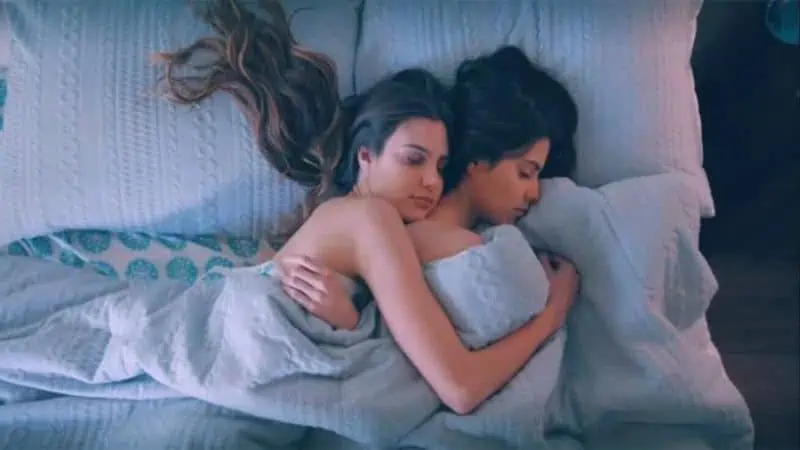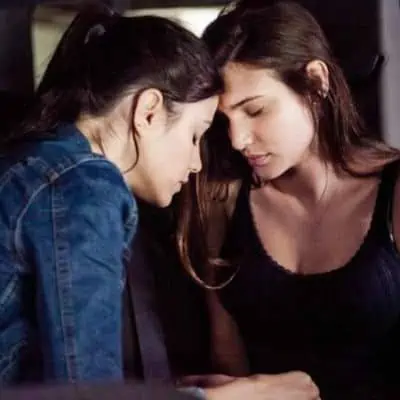
Latine Lesbian Visibility on TV: My Special Interest in Juliantina
April 26 marks Lesbian Visibility Day, which also coincides with Autism Acceptance Month. As a Puerto Rican autistic lesbian, this date is very important to me. In celebration, I want to talk about my autistic special interest: the lesbian romance between Juliana Valdés and Valentina Carvajal in the Mexican telenovela Amar a Muerte (Love to Death), which fans of the show refer to as “Juliantina.” A special interest is a passion for a topic or activity that autistic people will put a lot of their time, energy and attention on, and it’s a healthy and often rewarding aspect of being autistic. For me, my special interest in Juliantina has helped me deal with the way the COVID-19 pandemic has affected my mental health, and it’s also been a way to celebrate being a lesbian Latina—an identity I rarely see portrayed on TV.
I think it’s safe to say that the COVID-19 pandemic has been hard and unpredictable. It has affected everyone in so many ways, but the biggest way it has affected me was I became more isolated. I have been stuck in my house most of the time since March 2020 and it really has taken a toll on me mentally. In October 2020, I ended up tackling more than I could handle with Zoom calls, doctor appointments, and coping with the general state of the world. The energy I expended taking all this on, combined with emotional overload and stress with the major changes in my life led to me experiencing what’s called “autistic burnout.” I had problems making decisions and managing my day-to-day life, I suffered from lack of motivation, and I became physically ill. These are all common symptoms of autistic burnout, and if you want to learn more, you can check out this infographic by the Autistic Women & Nonbinary Network (AWN).
Well, to cope with my burnout, one day I ended up searching for TV shows with lesbian couples. Which is how I found Amar a Muerte. Juliana Valdés, played by Barbara Lopez, and Valentina Carvajal, played by Macarena Achaga, were not the show’s main characters, but their love story ended up becoming the most popular thing about the show. Their story was incredibly well-written and beautifully acted out. In fact, their story became so popular that the popularity of “Juliantina” eclipsed the show they were from. People just wanted to watch the Julantina scenes, and fans would create videos of their scenes and subtitle them in English. That’s how good and strong their love story is.

The pairing of Juliana and Valentina is the first LGBTQIA+ couple in a Mexican telenovela and one of the first LGBTQIA+ couples on Mexican TV. To me, it’s also the first couple I saw featuring Latina women. Most lesbian representation, and LGBTQIA+ representation in general, is mainly focused on white, English-speaking couples. Since I believe Barbara Lopez (Juliana) and I have similar features, when I watch her with Macarena Achaga (Valentina), I feel represented. I feel seen. Watching them speak Spanish also means a lot to me. Juliantina is a huge step towards positive non-white LGBTQIA+ representation.
Now before I continue, if you don’t want any spoilers, go watch the show now.
Ok, that said, if you’re still unsure about investing time in the show, I feel that it’s important to say that Juliantina got a happy ending. So many romances between women on screen end in tragedy or are short-lived. Queer women romances have ended like this for decades now. This trend really came to people’s attention when Lexa was killed on The 100 in 2016. I feel like Juliantina and their fate was one of the first signs that things are improving for representation of queer women on television and in film.
I’m proud of being a lesbian, and proud of being autistic. However, sometimes my autism can make participating in the LGBTQIA+ community difficult. I do have challenges with social skills including socializing with other women. The fact that most LGBTQIA+ social gatherings are at venues with loud music presents another challenge, because my autism causes me to suffer from noise sensitivity. Plus, like any community, the LGBTQIA+ community includes people who are ableist and have biases against autistic people.
On top of these challenges, the COVID-19 pandemic is making it hard to even go to LGBTQIA+ events and socialize with anyone. So naturally, I was on dating apps. Yet I found meeting people online really challenging. Together with the challenges I was already experiencing from COVID-19, every time I was rejected it made me feel even more isolated.

Yet when I found Amar a Muerte’s Juliana and Valentina, they gave me hope. These two women perfectly capture what it must be like to find true love in a way they didn’t expect. Unlike my story, neither character expects to fall in love with a woman. The two have amazing chemistry on screen, even before they fall in love. The acting really stands out. There are scenes where you can see it in Valentina’s eyes that she’s falling in love with Juliana. Valentina’s pupils even dilate when looking at Juliana or after kissing her. How did Macarena Achaga do that!? You can also see them falling in love by how each hug becomes longer than the last.
I recommend every queer woman watch Juliantina. Unfortunately, watching their story in the U.S. can be difficult because of licensing issues. Currently, Amar a Muerte is available to stream on VIX. However, I’m not sure if VIX has English subtitles for every program on the service, including Amar a Muerte. So I’ve relied on Juliantina videos with English subtitles created by English speaking fans. Shout to the fans for making this possible!
There is currently a selection of clips of subtitled Juliantina scenes from Amar a Muerte saved to a fan-made Dropbox folder. This playlist compiles all their scenes, including the censored and deleted ones. [Access it here].
Because it is translated by fans, there are some differences to what’s actually said in Spanish. For instance, in one clip from the first playlist, Valentina actually says “I love you. I love you so much” instead of “I care about you. I care about you a lot” and Juliana says “I love you” instead of “I like you”.
While Juliantina did get a satisfying ending when Amar a Muerte ended in March 2019, many fans have hoped for more. It was announced a few months later that the people behind the original show were working on both a movie and a spin-off show focusing on Juliantina, with both of the actresses reprising their roles. Words cannot express how excited I initially was for this, especially since they would’ve been the main characters this time around. Unfortunately, the COVID-19 pandemic impacted production. Whether the movie and spin-off show will still happen is still unknown 3 years after being announced, and I check constantly for updates.
Juliantina, after all, still is a special interest of mine, which means I often can’t stop thinking about it. Unfortunately, special interests are often stigmatized. Many autistic people, including myself, have experienced being shamed for our special interests (learn more in this blog by C.L. Bridge). Yet I am glad to have special interests, and there’s nothing wrong with them if they make autistic people happy. Juliantina was, and still is, like comfort food for me while the world is in chaos. I’ll always love Juliantina because of their wonderful story, their chemistry, how they represented LGBTQIA+ Latine people, and how I personally relate to the characters. And I’ll always be grateful for them helping me during a global pandemic.
I hope this blog post will get you interested into Juliantina too. I’ve included information to learn more about the show below, and how you can contact me (I’m always happy to talk about it!). I also created a petition to show the producers of Juliantina that we, the fans, still want the movie and series that was announced in 2019 to happen, which you can view and sign here.
Sincerely,
Kayla Rodriguez
Autistic Women & Nonbinary Network
Executive Advisory Board & Divergent Committee

@theKWomanRules (Twitter)
@KaylaRod (Instagram)
To follow the actresses who played Juliana (Barbara Lopez) and Valentina (Macarena Achaga) on social media, here are their Twitter and Instagram handles: @barbara_lopez21 and @macabeso.
For updates on the Julantina movie, follow the official Juliantina movie social media accounts: @juliantinafilm on Instagram and @juliantinamovie on Twitter.
Here is a podcast on Juliantina from Lesbians On Screen: https://open.spotify.com/show/4WsFMoXz4kJACMsD09yKzW
